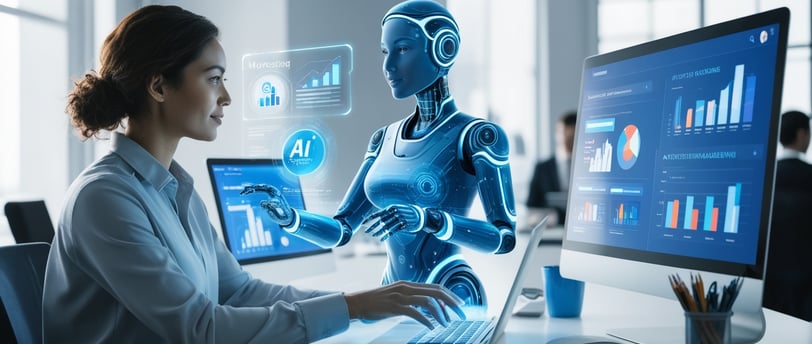Common Myths about AI Replacing Humans in Marketing: Insights from Weboost
Discover the truth behind common myths about AI replacing humans in marketing. In this insightful article, we explore how AI and human collaboration are shaping the future of digital marketing. Learn why AI can't replace human creativity and emotional intelligence, and how combining AI with human strategy leads to better results. This post is a must-read for marketers looking to enhance their strategies with AI while maintaining a human touch. Dive into the latest trends, data, and case studies that highlight the synergy between AI and human expertise in today's marketing landscape.
P
9/10/20242 min read


Common Myths about AI Replacing Humans in Marketing: Insights from Weboost
Introduction to AI in Marketing
AI (Artificial Intelligence) is revolutionizing digital marketing, helping businesses analyze data and improve campaign efficiency. But will AI really replace humans in marketing? Let's explore this issue by debunking some common myths.
Myth 1: AI Will Take Over All Marketing Jobs
Many fear that AI will take over all marketing jobs. This myth arises from AI's rapid advancements in areas like local SEO and social media marketing. However, AI cannot replace human creativity and emotional intelligence. Marketing requires creating compelling stories that resonate with audiences on an emotional level—something that remains uniquely human.
Myth 2: AI Can Make All Marketing Decisions Without Human Input
Another common myth is that AI can make all marketing decisions. While AI excels at data analysis, it still lacks the ability to fully understand context. Strategic decisions require human insight and creativity. AI can suggest actions, but humans must guide the overall marketing strategy.
Facts and Data Supporting AI's Role
AI is already widely used in marketing. For example, according to Salesforce, 84% of marketers use AI in their operations, including tasks like email marketing and social media management. Adobe reports that 28% of marketing tasks are currently automated. Digital marketing with AI leads to significant cost savings and revenue increases.
It is predicted that AI will create 8.9 million jobs by 2025, though it will also displace about 7.1 million jobs, resulting in a net gain of 1.8 million jobs. Gartner predicts that by 2022, 20% of marketing tasks will be automated, which may lead to a 10% reduction in staff but also create new roles in AI development.
Human and AI Collaboration
The best marketing results are achieved through collaboration between humans and AI. AI handles repetitive tasks, such as data analysis, allowing humans to focus on creativity and strategy. For example, Coca-Cola used AI to personalize ads, resulting in a 10% increase in sales. Similarly, American Express achieved a 20% increase in engagement through AI-driven offers.
Future of Marketing with AI
The future of marketing lies in the harmonious collaboration between humans and AI. As technologies like Explainable AI (XAI) develop, AI decisions will become more transparent, increasing trust in this technology. Data management platforms (DMPs) will play a crucial role in ensuring high-quality data for AI models.
Summary and Conclusion
AI is a powerful tool in digital marketing, but it cannot replace human creativity and strategic thinking. At Weboost, we believe the best results are achieved by combining AI's power with unique human skills. Want to learn more about integrating AI into your marketing strategy? Contact us today!
P.
Additional Resources or Links
Related Articles: "How AI is Transforming Digital Marketing", "Top 10 Tools for AI-Driven Marketing", "The Future of AI in Marketing: Predictions and Trends".
Tools and Reports: Salesforce "State of Marketing" report, Adobe "Digital Trends" report, Forrester "The Future of Work" report.
